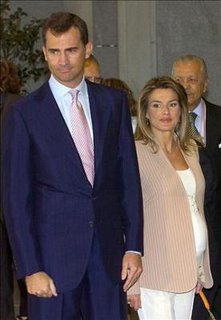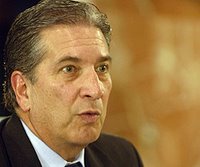Queen Leonor of Spain

"It´s a girl!"
That´s the buzz here in Madrid after Spanish Princess Letizia Ortiz gave birth to a baby girl early this morning. Princess Leonor, who was born following a cesarean section and weighing in at nearly four kilograms, could become the second in line to the Spanish throne after her father Felipe de Bourbón, the prince of Asturias. That is, of course, if the Socialist government of José Luis Rodríguez Zapatero makes good on a campaign promise to modify part of the country´s constitution that addresses the royal line of succession.
As of now, the Spanish constitution states that only male heirs can ascend to the Spanish throne. Felipe, the youngest of King Juan Carlos and Queen Sofia´s three children who was born in 1968, will one day become king, sidestepping his two sisters the infantas Elena and Cristina. Any constitutional change must be put to a vote in a referendum. If approved, Leonor could become the country´s first female head of state since Queen-regent Maria Cristina briefly held the title in the late 19th century when her infant son, the future King Alfonso XXIII, was not of legal age.
Prime Minister Zapatero, a champion of equal rights for all genders in this country, says the constitution must be modified to guarantee that there is no sex discrimination when it comes to the Spanish monarchy. Some analysts warned that if the constitution is changed the infanta Elena would be able to challenge her brother for succession. But Socialist government officials said that the text would be written so that any female heirs would be eligible after Felipe.
Spaniards of all generations love their monarchs. Here, there is no rancor like there is in Britain over complaints that the monarchy is feeding off public coffers with nothing in return. Perhaps because the Spanish king and queen live off a modest stipend in comparison with their British counterparts. King Juan Carlos is also loved and respected because of his role in solidifying and preserving democracy. Next month will mark his 30-year anniversary on the throne. His investiture along with a new era for Spain came following the death of Francisco Franco and the end of four decades of rightwing dictatorship. King Juan Carlos put into motion the foundations for democracy by inviting all political parties to participate in reforming government. The pinnacle of his reign that has earned the monarchy the respect it has today came during tense moments on Feb. 23, 1981. Civil Guard Lt. Col. Antonio Tejero broke in the Chamber of Deputies and fired gunshots in the air in an attempt to seize power. King Juan Carlos went on television to reassure citizens that the Army would obey the constitutional order and not resort to another dictatorship. The following day thousands of Spaniards marched in the street in support of democracy and their king.
Leonor, who may be queen one day, is now part of a great legacy initiated by her grandfather.






